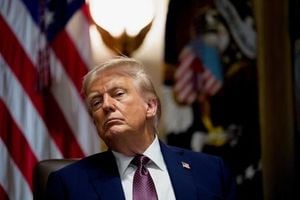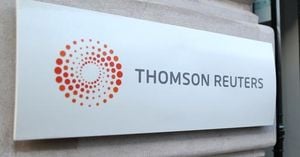On January 31, 2025, John Harold Rogers, a former senior adviser to the Federal Reserve Board of Governors, was arrested on serious allegations of economic espionage, inciting significant national security concerns. Prosecutors contend he conspired to steal sensitive financial data with potential ties to the Chinese government, which could enable manipulation of U.S. financial markets.
According to U.S. Attorney Edward R. Martin Jr., Rogers used his insider status within the Federal Reserve to relay confidential economic information to Chinese operatives. "This defendant leveraged his position within the Federal Reserve to pass sensitive financial information to the Chinese government, a designated foreign adversary," Martin stated.
Rogers, who advised the Fed's Division of International Finance from 2010 to 2021, is facing charges of conspiracy to commit economic espionage and making false statements. If convicted, he could face up to 15 years imprisonment for the conspiracy charge alone. The legal troubles for Rogers reportedly began following years of alleged misconduct, with the conspiracy purportedly stretching from May 2013 to the day of his arrest.
Details from the indictment reveal troubling interactions between Rogers and co-conspirators believed to be affiliated with Chinese intelligence. They posed as graduate students from Shandong University of Finance and Economics, which raises questions about the recruitment tactics utilized by foreign entities to infiltrate sensitive U.S. institutions.
The information Rogers allegedly provided could allow China to manipulate U.S. markets similarly to insider trading. Martin's team emphasized the dangers posed: "Gaining advance knowledge of U.S. economic policy, including advance knowledge of changes to the federal funds rate, could provide China with an advantage when selling or buying U.S. bonds or securities.” Such knowledge, if exploited, could skew economic balances and harm American interests.
News reports indicate Rogers was remunerated approximately $450,000 as part-time faculty at the unnamed Chinese university he was associated with, in addition to receiving payments covering his travel and accommodation associated with meetings with the conspirators. Evidence suggests he went so far as to print sensitive Federal Reserve information and allegedly met his contacts in hotel rooms during his visits to China.
According to the indictment, Rogers even made attempts to obtain highly sensitive data sets and briefing documents directly related to Federal Reserve policy deliberations and decisions. These materials are among the carefully guarded secrets within the government. Statements from the Federal Open Market Committee (FOMC) meetings are known for their immediate and significant impacts on global bond and equity markets.
Rogers's case accumulates on the backdrop of heightened tensions between the U.S. and China, which includes widespread accusations against China from U.S. intelligence officials of espionage and efforts to undermine American interests through data theft and cyberattacks.
"The Chinese Communist Party has expanded its economic espionage campaign to target U.S. government financial policies and trade secrets..." remarked David Sundberg, Assistant Director of the FBI’s Washington Field Office, underscoring the severity of the threat Rogers's alleged actions pose. The recent legal troubles faced by Rogers reflect broader anxieties about the vulnerabilities within American financial governance and the need for vigilance against such foreign threats.
Meanwhile, the Chinese embassy responded to the accusations by stating, "China is a country...that upholds the rule of law...we oppose any smear and attack on China with so-called 'spy risks.'" This statement suggests tensions are likely to escalate as this espionage case gains national attention.
A federal judge has ordered Rogers to remain detained until his next hearing scheduled for February 4, leaving many to wonder about the outcomes of this high-profile case. It serves as both a legal statement against espionage and as a cautionary tale for professionals working within sensitive government organizations. The FBI and the Federal Reserve's inspector general continue to investigate possible breaches of national security and the threats posed by international bodies seeking sensitive information.
This incident sharply highlights the challenges faced by the U.S. government and its financial institutions. The need for heightened security protocols may now come under review as authorities work to prevent similar breaches by foreign adversaries and protect the integral workings of economic governance on U.S. soil.



